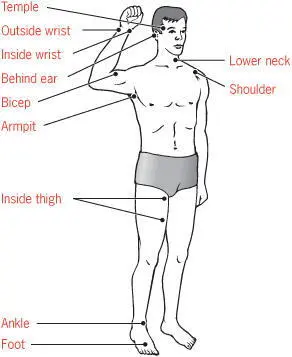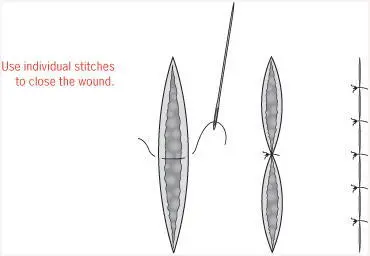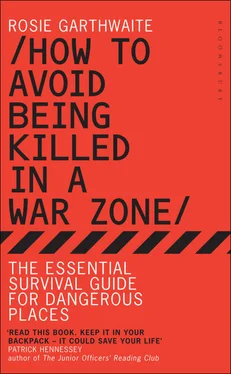
Tourniquets
The subject of tourniquets is very controversial in the medical community because people have lost limbs when they have been applied too tightly or left on for too long. Note the following rules:
• They should be used only when trying to tie the end of an artery.
• They can be applied in only two places – around the upper thigh near the crotch, or on the upper arm near the armpit. They cannot and should not be applied to other parts of the body.
• The tourniquet should be made of a cloth around 3 cm wide so that it does not cut into the limb or damage any nerves.
• Wrap it around the limb at least three times and tie a loose knot (A). Put a stick or pen on top of the knot (B) and tie another knot over the top (C). Twist the stick until the blood stops flowing, then tie a piece of string around the top of the stick to stop it unwinding (D).

• Check that fingers, toes and nails are not turning blue as this is a sign that the tourniquet is too tight and needs to be released immediately.
• Release the tourniquet frequently to allow blood to flow back into the limb.
• When the flow has stopped try to locate the severed artery so that you can tie the end with some string or fishing line sterilized in alcohol or by boiling. Then release the tourniquet slowly to see if it has worked.
• Never leave a tourniquet on long-term or unattended.
Treating wounds
• Preferably wearing latex or vinyl gloves, apply pressure with your fingers or a dressing of some sort until the bleeding stops. Be careful to avoid pressing down on anything stuck in the wound, such as gravel or glass.
• Raise the limb if you can while carrying out subsequent treatment.
• Clean the wound – with cooled, boiled cloths if you have nothing else – but do not remove any foreign objects and dead flesh unless there is no hope of professional help any time soon. If you must do so, use a pair of sterile tweezers.
• Gently apply antiseptic from the inside out to avoid passing infection inwards from unclean skin.
• Apply a dressing. If blood shows through, put another one on top, and reapply as often as necessary. The dressing will need to be changed if it smells or gets wet, or if the wound becomes infected.
• A deep, clean cut might need stitches. For this you need a sterilized needle and sterilized thread, and should start in the middle of the wound, working towards either end. You need to make individual stitches, pulling the two sides together and knotting the ends of the thread for each stitch.

• Butterfly stitches, which are actually plasters, require even more deftness to apply. One clean hand, preferably the casualty’s, should hold the cut tight while you open and apply the sticky butterfly stitches.
Warning:Try to get a tetanus shot as soon as possible after cutting yourself. This nasty infection is not caused by rust, as so often believed, but rather by bacteria found everywhere in the wild. If left too long, tetanus will cause painful lockjaw. Make sure your tetanus jabs are up to date before you travel.
When your help is unwanted
There are all sorts of reasons why someone might refuse your help. Hypothermic patients, for example, will be disorientated and unable to listen to your advice about what they should be doing to help themselves. People with a head injury also often have the illusion that they know what is best. And someone in a lot of pain might think it would be better for them to die right there than to go through the added pain of your trying to move them somewhere safe. Refusal could also be a cultural thing. A woman might not accept treatment from a man, or her family might refuse on her behalf even if she agrees.
The only advice here is to go in slowly. Approach with open hands and face and don’t rush a patient into doing something that might feel awkward for them. They might have a panic attack or go into shock if they are taken by surprise. Sometimes it would be better to instruct people they trust to do the work for you. The best approach always depends on the particular circumstances.
Following your instincts can get you into trouble. By the time I got to Iraq in 2003, I was better prepared than previously, having reminded myself of Red Cross basics. After a bomb at the UN shattered a hot Baghdad afternoon, my colleagues and I hurried to the scene. We were there for a story, not to help, but we spent the first 20 minutes ferrying people to the local hospital in our two cars. I stood still for a minute in all the mayhem. The man next to me looked into my eyes and then collapsed, a pool of his blood rushing out on the grass. I could see a piece of shrapnel, like a huge deformed salad bowl, stuck in his side. Ambulances were nowhere near and I knew it would be better if he were lying on his other side, off the shrapnel, so I rushed in without thinking and was trying to roll him over. Suddenly, I was surrounded by a crowd of men and aware that I had run out wearing only a small T-shirt, not my usual billowing Iraq-friendly ‘Dad shirt’. In their eyes I was a practically naked girl groping a man. I stepped back and left the scene altogether to murmurs of ‘whore’ in Arabic. The man died, but there was little I could do.
/A–Z OF MEDICAL EMERGENCIES
Abdominal injuries
Basic cuts to the abdomen can be treated like any other wound – simply cleaned and dressed. But if some of the guts are exposed or even falling out, different treatment is required.
Action:Do not dress the wound. Do not attempt to put anything back inside. Doing the latter could cause further damage and will make the surgeon’s job more difficult. Keep the extruding organs damp and covered until you can get proper medical attention.
Warning:Do not give the patient food or water. They will need an operation, and it could be dangerous for them to ingest anything if there is injury to their intestines. Just wet their lips instead.
Allergies
Bee stings, milk, latex (gloves or condoms), anaesthetic, pollen, dust, nuts, shellfish and many other things can be deadly to some people. If you are working in a team, you need to find out about any health issues your colleagues have and how to deal with the symptoms when they present themselves. If any of you suffer from a serious allergy, the details should be written on the individual’s body armour and helmet. It’s also advisable to wear a medical warning bracelet (see Recovery position for adults and children).
First signs:Mild reactions may include struggle for breath; rash or swelling of lips, tongue, face, feet or hands; itchy eyes; tender stomach; if an allergen (the cause of the allergy) has been ingested, it may lead to diarrhoea or vomiting. More serious reactions may show as more extreme forms of these symptoms. The throat may swell, making it hard to breathe. This could sound like hyperventilation or an asthma attack. The allergy may also present as shock (see Shock), which might eventually lead to loss of consciousness.
Action:If anti-allergy medication is carried, use it. This is likely to be epinephrine (previously called adrenaline in Europe) which may be in a container that looks like a pen. The commonest brand is EpiPen®.
Читать дальше

 Tourniquets
Tourniquets





![Джонатан Димблби - Barbarossa - How Hitler Lost the War [calibre]](/books/385421/dzhonatan-dimblbi-barbarossa-how-hitler-lost-the-w-thumb.webp)







